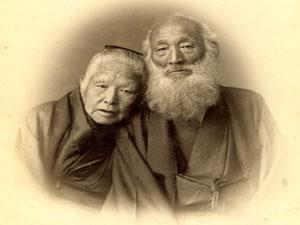100-year-olds go missing in Japan
(Image by Flickr user Okinawa Soba (cc:by-nc-sa))
This story was originally covered by PRI’s The World. For more, listen to the audio above.
Japan holds a legendary status as home to some of the world’s oldest people, with an estimated 40,000 citizens over the age of 100. That number is expected to rise as the population ages. But a recent, grisly discovery is now casting doubt on the city’s elderly.
Last month, in Tokyo’s Adachi Ward, social workers went to visit a 111-year-old, thought to be the city’s oldest man. When they entered the man’s home, the social workers found Sogen Kato’s mummified corpse. Near his body they found newspapers that suggested he’d been dead for 30 years.
“I honestly believed the man wanted to live in isolation,” Aki Animoto, the director of the ward’s elderly services division. For years, Kato’s son had been fending off social workers by telling them that his father wanted to be left alone. Police found out that the family had collected more than $110,000 in Kato’s widower pension money since his wife died.
The discovery sparked a series of investigations into the country’s centenarians. Nearly 280 have been reported missing, including Tokyo’s oldest woman.
The scandal highlights Japan’s inability to keep track of its elderly, according to Ryuichi Kaneko, a director at the National Institute of Population and Social Security Research. Japan doesn’t have a national identification system like Social Security in the United States, instead relying on local governments. In fact, deaths can sometimes go completely unnoticed, unless a family member reports it.
The situation also points to the changing family structure in Japan, Kaneko told The World. He believes that the Japanese used to pride themselves on looking after their elderly relatives. Now they’d rather live separate lives.
In some of the missing elderly cases, family members didn’t report deaths so they could continue collecting pensions. In other cases, family members didn’t even know their loved ones had passed away because they hadn’t spoken in years.
Now, volunteers are being deployed across the country to check in on the nation’s elderly. Animoto says that he now knows where 181 centenarians in the community are living. But he says one, a 103 year old, is still missing. He told The World, “I never imagined our ward’s discovery would lead to this.”
PRI’s “The World” is a one-hour, weekday radio news magazine offering a mix of news, features, interviews, and music from around the globe. “The World” is a co-production of the BBC World Service, PRI and WGBH Boston. More “The World.”
